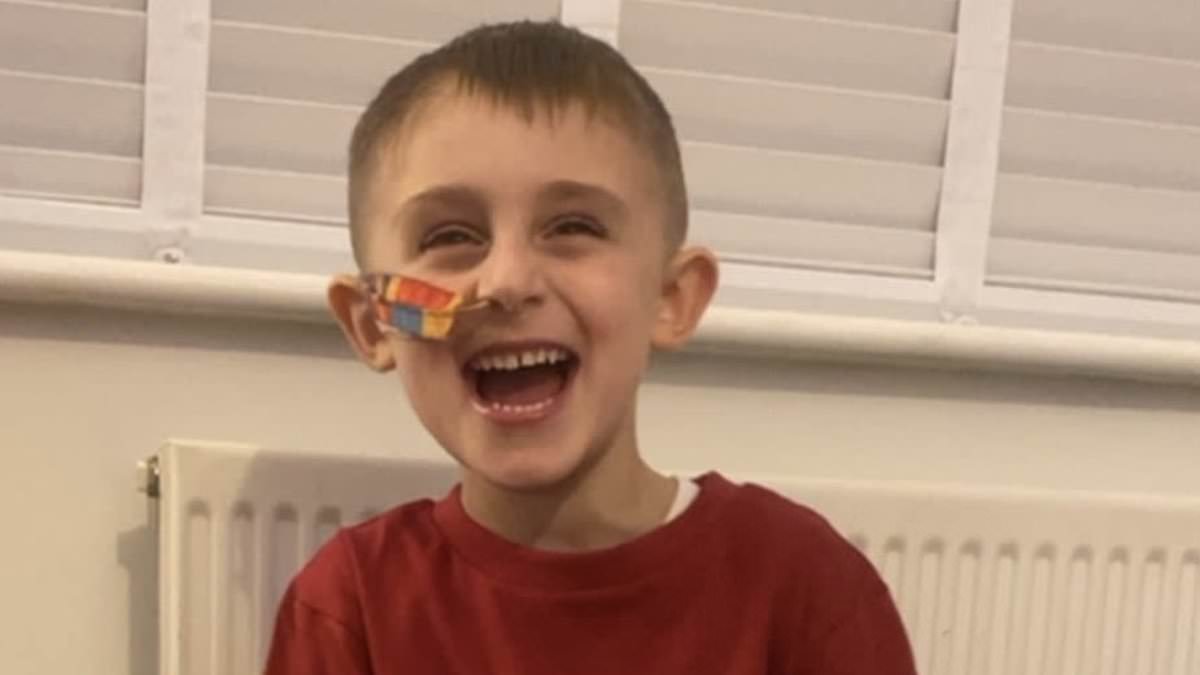A distressed mum has told of how doctors gave her son Gaviscon only for him to turn green and start throwing up as often as 10 times a day.
Fletcher Gale hadn’t been feeding properly or going to the toilet and was misdiagnosed at six-months with reflux and then told he had ‘mild constipation’.
Come age four, he started to turn green and began vomiting up his own faeces which left mum Hannah Johnson, 30, even more concerned.
Ms Johnson pushed for a scan which revealed Fletcher’s bowel was impacted and had been stretched because of the build up of his poo explaining why the poor boy had been left unable to control his bowel movements.
He was eventually diagnosed with slow transit constipation – a rare condition which occurs when the large intestine moves waste too slowly.
Ms Johnson, who is from Corsham in Wiltshire and runs her own cleaning business, said: ‘When he got to four he started to look green.
‘He vomited faeces from the mouth.
‘It was horrible. We just didn’t know what to do, where to turn.
‘Fletcher would often ask why this is happening to him, why he couldn’t go to the toilet like everybody else.’
‘We went to the doctors but they told at first it was acid reflux and to just use Gaviscon.
‘We kept going back and they said it was mild constipation.
‘It went on like that for years. He was rolling around screaming.’
It was in August 2023 that the X-ray pushed for by Hannah revealed Fletcher’s bowel was impacted.
Doctors tried to remove the blockage using an NG tube but when he was still in pain the tube was fitted permanently.
Fletcher then had laxatives put down the tube to try and ease his pain but remained incontinent.
Ms Johnson turned to ERIC, The Children’s Bowel & Bladder Charity, to try and get support and researched bowel conditions, stumbling across slow transit constipation.
She said ‘he had every single symptom listed’ and told the doctors what she thought it was and they performed a slow transit constipation study test.
Ms Johnson explained: ‘It involved swallowing counters.
‘On day five they see if they can find them in the body.’
The counters were still in the body which meant doctors could diagnose Fletcher with the condition around Christmas 2023.
‘No day is the same,’ Ms Johnson added.
‘You never know what you are going to get.
‘You might get 10 throw ups in one day or nothing.
‘He’s never fully recovered from it.’
Despite it all Fletcher has taken on a number of fundraising activities for ERIC, including selling poo emoji keyrings at school, and a litter pick and has raised almost £1,000.
Ms Johnson said: ‘Despite everything, he still gets up every day with a smile. He still tries his best at everything. He is super amazing.’
Fletcher is currently back in hospital for more tests as he still can’t get a formed stool.
‘We’re about to reach him being six and it’s been a long time.
‘He’s not showing any signs of regaining his bowel,’ Ms Johnson added.
The mum hopes to raise awareness to get more people talking about their bowel movements.
She said: ‘People don’t talk about poo.’
Doctors are now trying to manage five-year-old Fletcher’s condition but despite his pain the little boy has raised £1,000 for ERIC, The Children’s Bowel & Bladder Charity.
ERIC has launched a Christmas charity appeal to support families struggling with bowel and bladder issues.
Juliette Rayner, CEO of ERIC, said: ‘It shouldn’t be left to charities like ours to pick up the pieces once the problem has become unmanageable, but unfortunately that’s exactly what is happening.
‘There are families who are struggling with extremely distressing symptoms, who are unable to access support or even feel able to talk about it, because discussing wee and poo is taboo.
‘For 35 years, ERIC has been supporting families and helping to break down the stigma around these issues so that children and young people can access the support they desperately need. Like many other charities, however, the cost of living crisis is impacting us.
‘We rely on the support of donors to run our free helpline and provide online resources which act as lifelines for families who have nowhere else to turn. Our costs have gone up, but donations are much harder to secure at a time when people have less to give.
‘It costs around £40 for a continence expert to provide 30 minutes’ telephone support to a young person, so to keep offering that service, as well as all the online support we offer, we really need people to spread the word and donate.’
